Sample Janitorial and Commercial Cleaning Business Plan
This is a comprehensive tutorial on putting together a sample janitorial & commercial cleaning service business plan. This template can be used by cleaning services, janitorial service, commercial cleaning specialty and carpet cleaning businesses.
The goal was to write out a custom business plan using practical information and cover the main topics.
Some of the topics were too big and we had to use an introduction and then provide a link to the full resource. Every section has a link to view details of specific sections.
The plan divided into 6 sections:
- Business Description
- Services
- Marketing
- Management
- Operations
- Financial
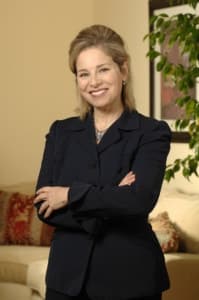
Executive Summary
Next Door Commercial Cleaning- Janitorial, Carpet Cleaning, VCT, Tile, Office Cleaning
In the executive summary we list all the main sections and then give a brief description of the topic.
- Business Description – Next Door commercial cleaning service located in Toledo Ohio and was incorporated as an S Corp July 2020. We are currently in the start up stage with August 1st 2020 as our first day of business. We currently have 3 employees, one marketing person and 2 cleaning technicians. ND currently leases 5 000 sqr feet of office and warehouse space out of Toledo. Our current target market is employers with 50- 100 plus employees, primarily professional offices with cleanable office space of 10,000 sqr feet minimum.
- Services– Next Door will provide daily cleaning services to local businesses including an emphasis on specialty cleaning services such as : Carpet cleaning, hard tile cleaning, VCT waxing, furniture and general disinfecting. Most businesses don’t have the time to recruit, hire and especially training cleaning staff. It can take 3-6 months to train a good cleaner, this is time, money most businesses would rather devote to their specialty and their clients and not on maintaining a clean building.
- Marketing– The company is going to use Account Based Marketing, what this means is weighting our budget to best payoffs. The strategy is to shift our resources to the biggest payoff and not market to every business equally. Some businesses will spend $1200 year, while others might spend $50k. We want our marketing plan to reflect that . This can really hit home – if we apply 80% of our effort to just 20% of our leads (our Key Accounts) we will receive 80% of the rewards.
- Management– As we grow especially in commercial services where its common for businesses to have 10, 20 and even hundreds of employees. We want to avoid this first slide of every employee, every customer, invoice, equipment question coming to you directly. This is guaranteed to fail eventually and create lots of stress in the process.
- Operations– Commercial cleaning employee manual or handbook, this can be used for janitorial, carpet cleaning and commercial cleaning services. The purpose of this sample is to share some topics and general information to include in an employee manual.
- Financial– The financial part is the final part of the business plan and here we will use charts, graphs and spreadsheets mainly to map out a long term successful future.
1.Business Description
Our current target market is employers with 50- 100 plus employees, primarily professional offices with cleanable office space of 10,000 sqr feet minimum.
Client sustainability is going to be the main variable to consider when deciding which business to market to. We want to be thinking of industries that will be in business for the next 20 years.
Medical, clinics, doctor, technology, professional services like architect, law, financial. We see these as basic services that will survive the ups and downs of the macro economy. The main threat long term is the use of remote workers but we feel this is still a long ways out in large numbers.
Next Door plans to be diverse offering daily building cleaning services and also high margin specialty services. We believe this mix will balance our revenue/profits out over long term macro changes.
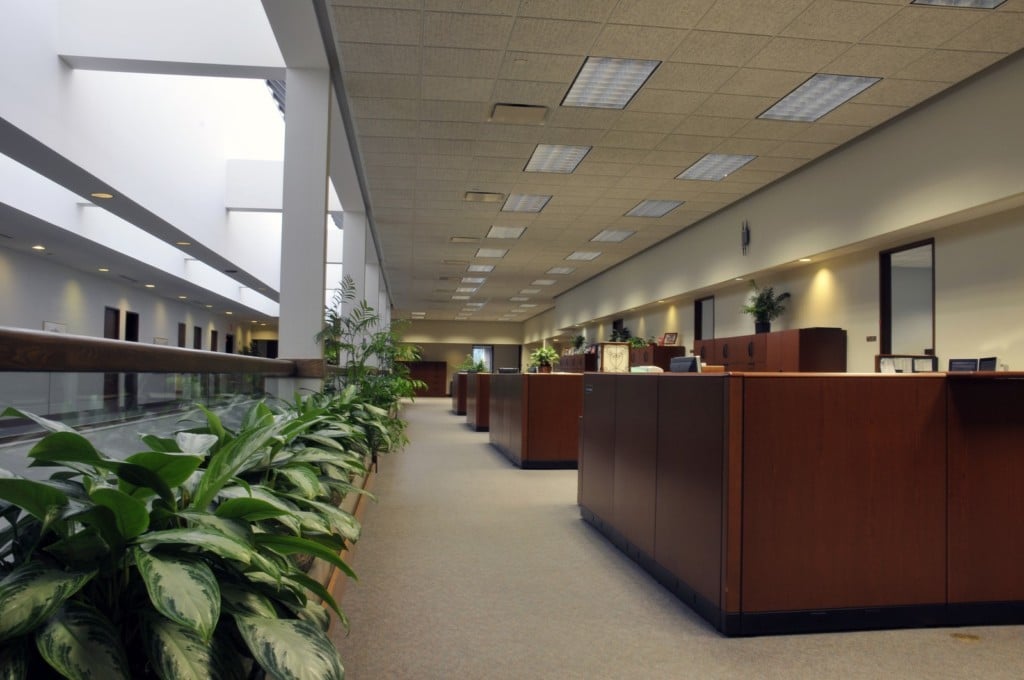
1.1 Industry Overview
Currently the retail sector of the industry is a mess and very difficult to make work. As more people continue to buy online retail stores continue to close stores and significantly cut back on cleaning budgets.
Right this second hospitality is also in shambles with pandemic and government ordered shutdowns or limitations on capacity. This includes restaurants, hotels, leisure, etc. We believe there will be permanent damage to this sector and will stay away for the first couple years. Even when they do get back on their feet they will be keeping budgets tight.
Industrial businesses are hit and miss, really depends on the specific product they make. This will be a sector ND will keep in the marketing mix
Medical, including hospitals clinics and doctor services are always needed and with an aging population only will be needed more. The only risk long term is more doctors using online tools to speak with patients but they will always need to see patients face to face somewhat.
Professional services including technology, lawyers, engineers, management, etc is one of the safest in our opinion long term. These are services that can’t be replaced easily by future robots. These services require thinking and not just repeating tasks. The risk is remote staffing but we feel in large numbers there will always be enough office space needed.
Commercial Property Management is currently experiencing a lot of financial problems with 20-30% of tenants not paying leases. We will be avoiding this sector over the short term.
1.2 Company Description
Next Door is an S Corporation formed in the state of Georgia with 2 shareholders Jason & Lisa Jones. The state or city does not require any special permits or licenses. The company will provide building cleaning services to other businesses.
The office/shop is located in between 2 main thruways giving access to all areas throughout the metro area within 30 minutes. This was a major reason for choosing this location, it is centrally located. Also with commercial cleaning businesses we needed warehouse space to hold various equipment and store misc cleaning products.
Office is currently leased for 5 years.
Most cleaning staff will report directly to the buildings they service and not come to the office often. The office will be staffed with marketing, management and human resources. Supervisors will share workspace in the office but mainly work in the field at client buildings.
Because of this we only needed 3000 sqr feet of office space and 2000 sqr ft of warehouse.
Mission Statement Our goal is to provide a clean and healthy environment for our customers through state of the art cleaning technology and a commitment to customer service
Method Clean Biz
Safety is a priority for our customers and employees, while in your facility we follow a detailed health & safety program, This insures quality service, happy employees and competitive prices.
One of the things Next Door wants to be about is safety, this is as a value proposition for marketing but also be aggressive in training, supervising employees through monthly safety meetings. We feel this is a topic that will be important in the forseeable future.
Also the large employers we target are generally the ones that care about safety. Under 50 employees you will start to see the topic be less and less important.
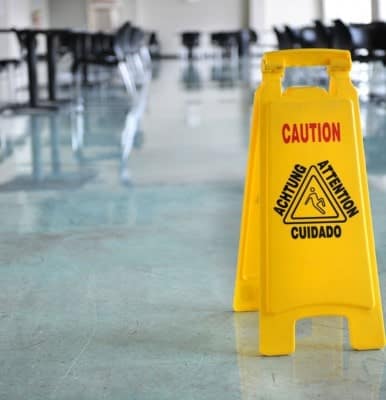
1.3 History and Current Status
The company is a start a up and we don’t have any history to share. Jason and partner Lisa Jones started the company August 1st 2020. Jason has worked in the commercial cleaning industry for 20 years as a former franchise owner, operations manager and salesperson for 2 different businesses in the industry.
Lisa is a former office manager and salesperson for a landscaping service for 7 years with an MBA from Georgia University.
Jason feels after 20 years in the industry with practical real life experience in various management roles that the industry is changing and one variable is to focus more on high margin project work to combine with lower margin cleaning contracts.
Lisa has an MBA and can add the business structure needed to grow and sustain long term growth.
Both have experience in sales specifically in the service industry and know how to market, sell contracts.
1.4 Goals and Objectives
The goal is to build the business to about $1.5 million in sales with an owner benefit of about 20% which equals about $300k in benefits, wages and profit for the shareholders. The timeline is 5 years with a slower rate in the first 2 years while they are building the core infrastructure and then dramatically scale that up in years 3-5 after the core is solid.
One of the experiences Jason has had is small businesses growing too fast too early and then crashing because they don’t have enough management in place. Often owners try to do everything themselves and burn out.
1.5 Critical Success Factors
The key to success in the cleaning industry is human resources, people. Recruiting, hiring, training and supervising staff and also developing management, supervision talent in house. We feel the best way to grow and sustain it long term is by developing our cleaners into supervisors.
Each lead person is creating the next lead person. Trying to hire supervisor’s from other cleaning businesses comes with a lot of challenges, some have bad habits to begin with that are difficult to change. Also run the risk they quit after a short time and have information about the internal workings of the business and client lists, training material etc.
Training and supervision will be key success factors. The challenge In the cleaning business is employees are working at the customers location, mainly unsupervised on an hour by hour basis. This is why hiring the right people in the first place is so critical and then getting them in a routine through training.
We will create a culture of everyone sticking together and supporting each other. With 90% of the workforce working remotely it becomes important we communicate with each other on a regular basis and trust each other.
There will be a big emphasis on communicating nightly through email, text, phone so employees are tuned in.
1.6 Company Ownership and Exit
The company has 2 shareholders with Lisa owning 40% of the shares and Jason 60%. Each has the option to buy the other out at an agreed upon price after 5 years. Shares cannot be sold to a third party unless agreed to by both.
Jason will hold the title of CEO and have direct authority over Operations dept. Lisa will have the title of President with administrative and Sales/Marketing directly reporting to her.
The long term plan is operate the business for approximately 15 years and sell to the general public splitting the sale price 60/40.
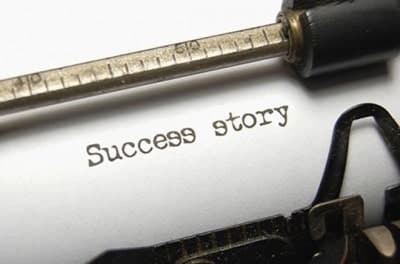
2. Services
Most businesses don’t have the time to recruit, hire and especially training cleaning staff. It can take 3-6 months to train a good cleaner, this is time, money most businesses would rather devote to their specialty and their clients and not on maintaining a clean building.
The 2nd part is specialty work. Most businesses do not want to invest $10ks of dollars of capital into cleaning equipment that is used 1x month or maybe even only a couple times a year. Also the training of employees required, again for a task that might only need to be done a couple times a year.
Businesses would rather spend that capital on areas where there is a much bigger payoff.
1.1 Service Description
- Daily janitorial and office cleaning
- Carpet steam cleaning truckmount
- Carpet cleaning low moisture
- Hard surface steam cleaning including ceramic, porcelain and quarry tile
- VCT floor waxing, polishing
- Office furniture steam cleaning
- Disinfecting services
Daily Janitorial and office cleaning
The company feels the key to success in daily cleaning is one initial training and two communication. Often cleaning businesses are small and lack management talent, understaffed and overall desperate for bodies on any given day.
We feel the competitive advantage is in training cleaners not only the technical skills but also the importance of service skills. Often clients will like a cleaner and think they are the greatest in the world even if their technical skills are average.
NEXT DOOR wants to make this a key part of training cleaning staff. Some of the training elements will be uniform, appearance, communication with the client, body language, how to address complaints, safety equipment like wet floor signs, tone to use when speaking with clients, etc.
Training will take approximately 3-6 months with technical training only taking 30% of the time. The company feels not only will we have happier clients but cut down on employee turnover by reducing the stress. We feel by training employee’s customer service skills they will also feel like we care about them and want to see them succeed in life in general.
More than anything clients want to know you care and we want to focus on training staff to be proactive in relaying that message. Most clients understand people are human and will make technical mistakes. BUT it is unacceptable to not care about a client building or the staff that works in that building when they are paying you.
2nd Key element is communication. Most cleaning employees work remotely and does not interact with management on a daily basis. This more than anything can lead to cleaners feeling like nobody is watching and worse nobody cares.
The company is going to be very aggressive in creating a communication system so we interact with every cleaner, every day in some way. Either by a supervisor stopping by, calling, texting or maybe even email in some situations. Our thinking currently is daily text alerts mixed with phone calls.
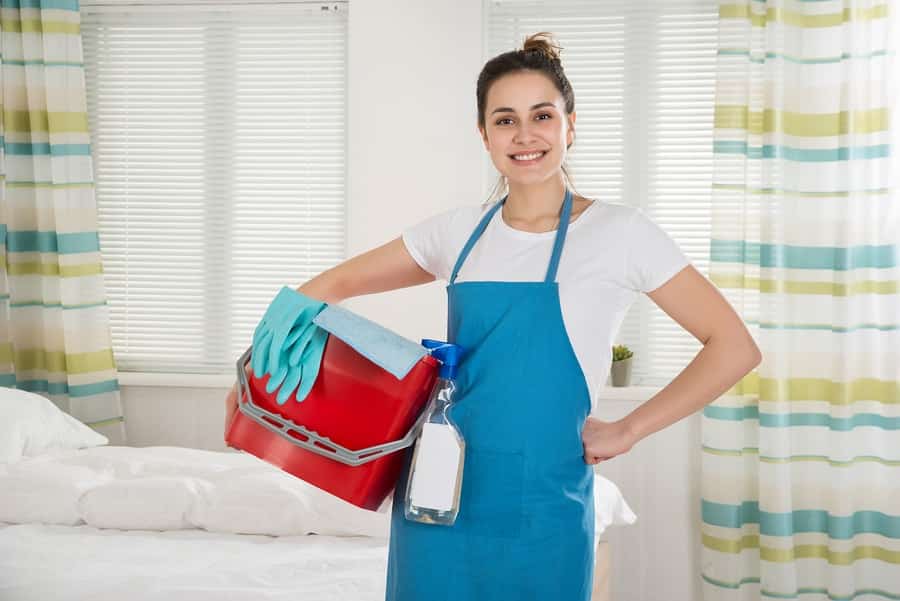
Carpet Steam Cleaning- Truckmount
The company will invest almost $40k in a van based carpet cleaning system. This system will allow us to steam clean carpets at a very high level of quality and production. With advanced systems we can have a 10 on quality and a 10 in production. This system can also clean up to 300 feet away from the van, targeting large employers we will need to work at great distances on a regular basis.
Carpet Cleaning- Low Moisture
An emerging and often overlooked service is using low moisture technology to clean carpets. With this service the company can sell high margin services at an affordable price. Often in larger buildings access can be a problem or they need the area turned over quickly, low moisture provides a quick 30 minute dry time.
Hard Tile Steam Cleaning
Using the van based carpet cleaning system we can quickly change tools and offer steam cleaning of various tools. This is another high margin service to offer and it makes the daily office cleaning a lot easier and quicker.
Often these areas are the toughest areas to clean: restrooms, lobbies, cafeterias and also the areas that receive the most complaints.
The long term goal is create a route just cleaning hard tile surfaces, the benefit is it’s a high margin service and also can help get our foot in the door to sell big monthly cleaning contracts.
VCT Floor waxing, Polishing
VCT flooring is usually located in high traffic areas like hallways, cafeterias and restrooms. We have found the overall appearance of a building can be greatly impacted by having shiny, clean looking floors. This can be accomplished by stripping old finish off and applying new or high speed polishing.
How clients “feel” about a cleaning service overall can come from how well a cafeteria floor looks. This is medium profit margin service in most cases because how labor intensive it can be. But can help greatly in the overall satisfaction of clients.
Office Furniture Cleaning
Office furniture is another high margin but niche service. The company will use the van based truckmount system in most cases to keep production high. This can include partitions, chairs and small sofas
2.2 Competitive Advantage
In section 2.1 we covered what we believe our competitive advantage is for janitorial and daily office cleaning.
Specialty cleaning services: carpet cleaning, upholstery, office furniture, VCT, hard surface cleaning has some of the same focus but there are two key points to make.
Two things we have found true with specialty services is most janitorial businesses are not very good at them. The main reasons are lack of training in staff and equipment. We believe in buying the highest production equipment available and spending considerable resources in training of technicians.
These two variables can give NEXT DOOR a significant advantage over competitors and get our foot in the door for janitorial services at client buildings of competitors.
#1 Using van based truckmounted system and also current low moisture carpet cleaning systems.
#2 Using dedicated technicians that have been through specialized training at certified organizations like the IICRC.
Often janitorial services will send general cleaners out to complete these tasks with limited training and modest equipment.
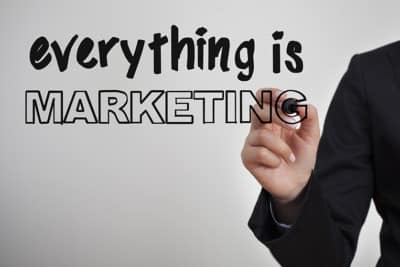
3. Marketing Plan
Marketing is a huge subject in itself, we already have a large section with a specific marketing plan. In this section we will give a brief overview and then the link to the full marketing plan.
3.1 Marketing Research
Toldeo Ohio metro area is the designated service area. Toledo has a total of 18,000 businesses but we need to narrow that number down to a manageable number.
Breakdown
Key Accounts– businesses with 100+ employees = 328
Businesses with 50 + = 659
Key Account total = 987 businesses
These represent where we will dedicate 75% of our budget and resources
Growth Accounts- businesses with 10 -50 employees = 4300
These are growing businesses that we will dedicate roughly 15% of our budget too. Remember some of them will grow to 50 employees over the long term.
Advertising– misc. advertsing will receive the smallest piece of the pie of 10%. This will include google, adwords, social media etc. The reason is we can’t control always who calls from a big advertising campaign, some will be big and most small but its still an opportunity for PR/Marketing and fill in gaps.
3.2 Competitors- High Barriers To Entry
Part of our marketing strategy is coming up with areas that are difficult for our competitors to easily repeat. If there is one thing we know about human behavior its if something is easy everyone will do it. So we want to look for tactics that are very difficult for our competitors to do.
Difficult to do: targeting businesses with 50 plus employees is a key part of this strategy. Most commercial cleaning services will find it very hard to do consistently over long periods of time. One of the biggest reasons is patience, larger jobs take a lot more patience and lets face it most cleaners are not very patient and our current society is built for on demand.
EASY To Do:
- Lead generation service
- Google search adwords
- Facebook marketing
HARD To Do:
- Telemarketing
- Door to Door sales
- Highly Targeted Google display ads
- SEO
- Direct Mail
3.3 Sales Plan
6 Simple Steps To Creating a Commercial Cleaning Sales Plan
How to create a commercial cleaning sales plan, this can apply to commercial cleaning, carpet cleaning and janitorial services. We are going to cover 6 steps to creating a dedicated sales plan we can follow every day, month and year. A sales plan is meant to be a living document that as we learn will be updated and improved over time.
Step 1 What is our objective or financial goal?
Step 2 What Resources are available, what is your commitment level?
Step 3 Targeting, who are the types of businesses you will focus on?
Step 4 Services, what services will you focus on?
Step 5 Activity Log- What physical actions will you take on a daily/weekly/monthly rotation
Step 6 Training- What Training do you need to accomplish your goals?
3.4 Pricing Strategy
Pricing Strategy- After deciding on a goal we then can create a pricing strategy.
Cost Plus– we figure our costs for a job and then add our gross margin. Our gross margin goals will be as follows
- Specialty cleaning jobs including carpet, tile, furniture and VCT- gross profit- 70%
- Small cleaning jobs less than $10k per year- 60% profit
- Medium jobs- $10k – $30k per year – 50% profit
- Large Jobs- $30k plus- 40% profit
The reason is smaller jobs require much more office support in fill in staff, supervision, training, supplies, etc.
Larger jobs are self contained with a team leader working on site at a client building to provide all those tasks.Supervisor will inspect 1x week.
Square foot– sqr ft or unit pricing is best when you have experience with a specific service and type of client. Sqr ft pricing will be used using the above gross profit goals.
Time and Materials– or another way to use this is hours X hourly rate. This is often used when you are unfamiliar with a service or type of client building. This strategy will be used when we are unfamiliar with a job, misc tasks, obscure requests and 1x jobs.

3.5 Sales Strategy
Strategy section: objective is increase cashflow, measure by percentage increase, goal is 30%. How do I increase our cash flow? How does this change our sales strategy?
In commercial cleaning, carpet cleaning or janitorial cashflow is extremely important, maybe the most important challenge we face. What happens whenever taking on a new project is we have costs of labor, chemicals, equipment, gas but might not see a payment for 30, 60 or even 90 days. First is the data or analytical part, we currently are at 22% and in previous months hovered around 24% but now need to greatly increase that.
How to: look at the current client list, is there a pattern with accounts that fall below our goals? Reduce invoice terms, is there a pattern of industries, sizes or areas that are paying in terms greater than 30 days net? Change our terms to 15 days net for all one time jobs, these are usually specialty cleaning services carpet cleaning, windows, small construction projects.
Over time I think most of us find certain industries have industry logic built in that it is commonplace to pay in certain invoice cycles. This is fine but something we have to think about as we grow.
For example you are currently cleaning a lot of property managers and they are all paying 60 days plus, that might be a situation where its time to stop marketing to that group and find a new target
3.6 Sales Forecasting
This is a quick video on using forecasting to determine when it is time to hire a new technician. Often us contractors wait until the last minute to hire new staff and that usually doesnt work out too well. Regardless if hiring a part, full time or casual employee its always best to plant the seed and start the process months before we actually need someone.
The easiest way is to create a table in word or spreadsheet in excel or just take a piece of paper and a pencil. This is an example of a sales forecasting table separate by 3 columns. Customer, estimate amount and probability or forecast.
In the first column list name of the customer or bid, examples medical building, restaurant and property management account. Second column list the gross amount of the bid, in this example we put $1000 dollars for medical, $12000 restaurant and $3000 for property management company. The total comes to $16,000.
To forecast list low,medium and high of 25 percent%, 50 percent % and 75 percent %. Now this is subjective, sometimes we win low % bids and lose bids we think we have nailed down, it happens.
At this point its time to start placing ads, time to collect and read resumes, interview the best applicants. You want to have all this pre-planned and set up 2 weeks, 2months and 4 months in advanced so when the work does come in you have a list of contacts to put in place.
4. Management
4.1 Company Organization
This second example is more of a traditional organizational chart for a commercial cleaning service, janitorial service. In this slide we show 3 departments: operations, sales and administration. You can see a big difference right away in this structure, instead of every employee reporting directly to you, now they report to the managers and the manager’s report to you.
The Operations Manager will have all the supervisors, team leaders, technicians, specialty cleaners and cleaning staff reporting directly to them.
Sales Person might have 1-2 assistants working for them setting appointments, sending out direct mail, emails etc. Often these can be part-time staff that either work inside sales setting appointments over the phone or outside sales/networker going door to door and attending events.
Office Manager or Administration might have the bookkeeper and 1-2 office assistants helping with employee interviews, HR, fact checking resumes etc. Note, some owners prefer to have the bookkeeper/financial staff next to them and report directly to owner and not under admin.
4.2 Professional Support
The company needs to make a list of various vendors, suppliers and professional services. Below is a starting list of vendors will need to hire.
- Lawyer
- Accountant/ Tax
- Financial advisor
- Equipment supplier
- Day to day cleaning solutions supplier Main
- Back up supplier
- Bank
- Payroll service
- Credit card
- Credit card processing
- Website hosting
- Digital marketing
- Design marketing
- CRM provider
- Technical consultants – IICRC or ISSA
- Business specialty consultants
- Insurance
- Phone service
- Van mechanic- tires, inspection, etc.
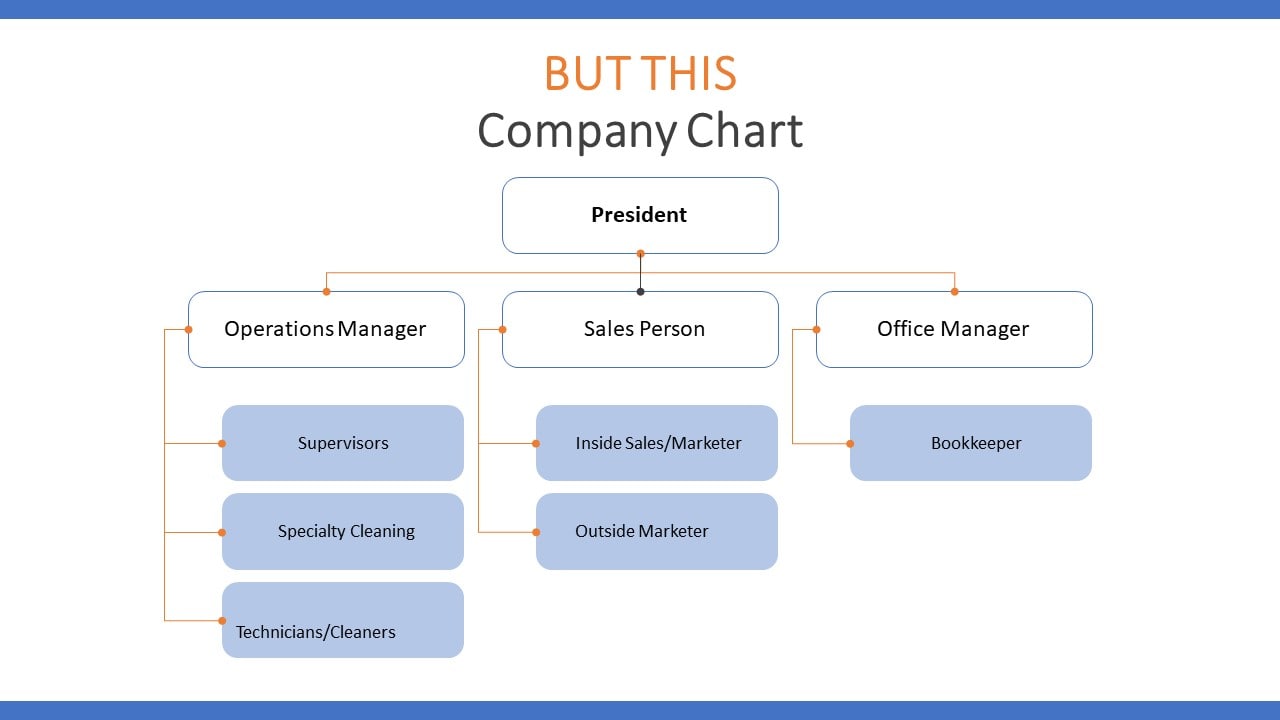
4.3 Management Structure
In this section we will show some examples of organizational charts to structure a commercial cleaning, janitorial or commercial carpet cleaning service.
As we grow especially in commercial services where its common for businesses to have 10, 20 and even hundreds of employees. We want to avoid this first slide of every employee, every customer, invoice, equipment question coming to you directly. This is guaranteed to fail eventually and create lots of stress in the process.
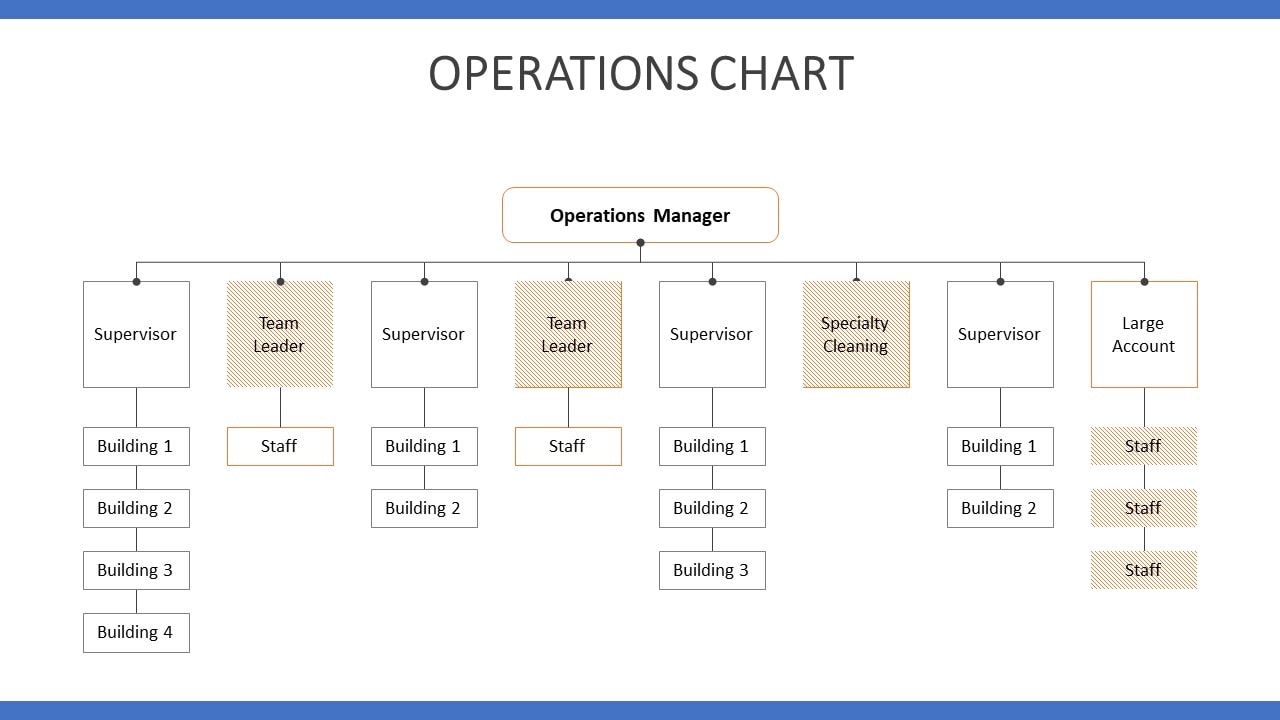
The Operations Manager will have all the supervisors, team leaders, technicians, specialty cleaners and cleaning staff reporting directly to them.
Sales Person might have 1-2 assistants working for them setting appointments, sending out direct mail, emails etc. Often these can be part-time staff that either work inside sales setting appointments over the phone or outside sales/networker going door to door and attending events.
Office Manager or Administration might have the bookkeeper and 1-2 office assistants helping with employee interviews, HR, fact checking resumes etc. Note, some owners prefer to have the bookkeeper/financial staff next to them and report directly to owner and not under admin.
5. Operations
5.1 Employee Handbook
Commercial cleaning employee manual or handbook, this can be used for janitorial, carpet cleaning and commercial cleaning services. The purpose of this sample is to share some topics and general information to include in an employee manual.
** Note this is not a legal document and any employee manual should be customized and verified with a local consultant or lawyer based on your specific state laws.
Welcome to Commercial Cleaning Service!
On behalf of our big family of fellow associates, owner, vendors, customers and management we want to welcome you to our team.
At Commercial Cleaning Service, we believe that every associate contributes to our growth and are also rewarded equally. We want every team member to take pride in driving our van, wearing our uniform and serving our customers to the best of your ability.
This employee handbook is a simple way to describe the expectations of our team members and outline the policy and procedures we follow to provide the absolute best service experience possible.
All associates are expected to become familiar with the contents of this handbook in the first 30 days of employment and share all questions they may have with management.
Topics to be covered:
- Timekeeping
- Direct deposit
- Termination
- Resigning
- Scheduling
- Phone usage
- Smoking
- Equipment usage
- Attendance
- Lockers
5.2 Recruiting, Hiring and Interview Process
How to hire employees for your commercial cleaning service. The goal is to create a flow chart to map out the hiring process, I find it very helpful to be able to see processes and map out the different steps involved. I feel it helps a lot in understanding and the actual follow through.
The 10 Essential Steps To Hiring Amazing Employees For Your Commercial Cleaning Service
- Job opening
- Job Description
- Identify
- Create Database
- Run ads
- Find Recruits
- Phone Interview
- Onsite Interview
- Decision
- Onboarding
Job Description
The first step is determining we have a job opening or several job openings and writing a job description. A job description has the basic tasks involved, hours/days, full time or part time, any certification or education requirements.
Identify
Identify the type of person we would like to hire. Some positions require a detail minded person while others need a lot of physical labor. It is our job to find good matches of the recruits with the position.
Database
Before running ads we want to create a database to hold all of this information and make it easily searchable in the future. Often we will have several qualified candidates but only one opening currently and want to find the other candidates later on.
Decide where we will run advertisements on, for how long and what is our total budget. The best place to start is referrals of course by sharing on social media and through email blasts of our current database and reaching out to former candidates. Some options for advertising are indeed, monster, local newspaper.
Find Recruits
Go over the resumes and score the best qualified candidates for contact.
Phone Interview
I personally like the phone interview first to reach out and get a feel for the candidate, ask a couple basic questions and make sure they understand the job description.
Onsite Interview
This will depend on the position of course, next an onsite face to face interview. Also can meet in a coffee shop, some people prefer a relaxed setting so candidates are more comfortable.
Decision
Go over all the information and make a final decision.
Onboarding
This is where we have the new employee fill out required paperwork, insurance, sign off on employee manual’s and layout the next steps.

5.3 Safety Meetings
The goal of this template is to create a 12 step safety manual with meetings on a monthly basis covering different topics. Cleaning businesses encounter several situations at clients building’s, company shop, office and driving to commercial carpet & tile cleaning jobs.
12 Month Health & Safety
Month 1 Introduction
The purpose of this health and safety program is to establish company standards for working in client buildings, driving in company vehicles and working in company office/shop.
The company has identified 12 key topics to be covered in monthly safety meetings that all employees must attend. It is intended that this manual is a “living” document to be upgraded and added to with input from employees, owners and managers.
- Introduction
- PPE- personal protective wear
- Electrical Cords
- Work area signs, tape
- First Aid
- Reporting
- Meetings
- Lifting
- Driving
- Vans/Equipment maintenance
- SDS Sheets, Chemical storage, mixing
- Security
5.4 Employee Compensation
Often, we try to reward employee behavior through bonus programs and focus on one specific performance at a time, for example an attendance bonus.
In this example instead, we are going to create a Balanced Scorecard using a point system. The difference is we will have 5 different performances instead of focusing on only one.
The points vary from poor to satisfactory to excellent and at the end of the review we will add the points up give a financial bonus based on the number of points.
The five variables we will be using in this bonus evaluation are
- Attendance
- On Time
- Inspections
- Equipment
- Customer Survey or Review
The Top 5 Performance Evaluations
Attendance- Attendance will depend on if the employee is full time or part time. I think we definitely have to weight this somehow. We could deduct a point for every day missed but honestly anymore than 1 is too many and even 1 is not good.
On Time- I understand some cleaning jobs when they clock in doesn’t matter a lot but for project work like carpet cleaning, floor work, etc. often clients are waiting for us, so it is critical.
Inspections- This can be a weekly or monthly inspection you would normally have. To make this easier I would just use a 5 point system or grades A,B, C,D,F and then transfer that to the scorecard.
Equipment- will depend on the type of service, for office cleaners we will be mainly looking at floor machines and maintaining vacuums.
For project work though like carpet cleaning, tile cleaning the equipment is critical and cost upwards of $50k plus. In that case I would weight it much higher than an office cleaning position.
Customer Survey or Review- This will break down between residential and commercial cleaning services. With residential nowadays reviews have become very important in digital advertising.
5.5 Inventory
The company will use an inventory control system made with excel spreadsheets managed by the operations manager. Inventory will be made on a 30 day cycle and 14 day cycle when cashflow is tighter in the first 2 years.
- On site inventory will be delivered and maintained by the building supervisor on a weekly basis. Cleaners and team leaders are to submit to supervisor supply needs and supervisor hands in worksheet to operations manager.
- Specialty Cleaners working out of shop will complete an inventory checklist daily and hand in to operations manager.
5.6 Credit Policy and Cashflow
The company will extend terms to clients following the sales strategy explained above.
Standard 30 days net
Exceptions 60 day net
60 day plus only authorized by CEO
Specialty cleaning jobs recurring 15-30 day net
1x Specialty jobs due on receipt to 7 day net maximum.
The company will follow this policy regarding tracking accounts receivable and payable
Complete an aging receivable at least monthly to track how much of your money is tied up in credit given to customers, and to alert you to slow payment problems.
Also tracking accounts payable using the same format.
Current- 30 day- 60 Day- 60 day + – Charge offs

6. Financials
The financial part is the final part of the business plan and here we will use charts, graphs and spreadsheets mainly to map out a long term successful future.
The main topics we will cover are:
- Start up funds and 1st year
- Income statement
- Break even point
- Cash flow
- Balance Sheet

6.1 Start up and 1st Year
In this section we think about all the money we will need to start up including 1x cost and monthly cost.
GENERAL/ADMIN
BANKING FEES $200.00 $15.00
CONSULT FEES $500.00 $95.00
OFFICE SUPPLIES $200.00 $60.00
LICENSE FEES $150.00 $15.00
BUSINESS INSURANCE $500.00 $380.00
TOTAL GENERAL/ADMIN $1,550.00 $565.00
SUBSCRIPTIONS $237.00
TOTAL OPERATIONS $- $237.00
MARKETING/PROMO
ADVERTISING $1,500.00 $1,800.00
PROMO $300.00 $50.00
TOTAL MARKETING/PROMO $1,800.00 $1,850.00
WEBSITE/MOBILE APP
DOMAIN $1,000.00 $30.00
HOSTING $- $30.00
TOTAL WEBSITE/MOBILE APP $1,000.00 $60.00
RENT/LEASE $- $750.00
PHONE $- $137.00
ELECTRIC $- $237.00
GAS $- $150.00
WATER/SEWAGE $- $50.00
WASTE REMOVAL $- $40.00
REPAIR/MAINTENANCE $- $200.00
SECURITY $- $25.00


Then Estimate what the first year will look like.
TOTAL START-UP COSTS $4,850.00
TOTAL RECURRING MONTHLY COSTS (1 YR = 12 MO) $87,612.00
TOTAL BUSINESS EXPENSES $92,462.00
ESTIMATED FIRST-YEAR BUSINESS INCOME $112,000.00
BUSINESS FIRST-YEAR PROFIT/LOSS $19,538.00
AVAILABLE CASH/ SAVINGS/OTHER $30,000.00
BUSINESS BALANCE $49,538.00

6.2 Break Even Point
In this section we look at how much revenue we need to generate to break even every month. This can be tricky sometimes for beginners, we want to calculate using a fixed monthly cost like rent and also a percentage of cogs or cost of service.
Fixed Cost $4,300
Cost of goods sold $3,000
Number of Jobs 1
Average Job Price $9,300

6.3 Income Statement
Our income statement is a profit and loss statement, looking at net income and then minus taxes to see net, net.

6.4 Cashflow
Cashflow statement is one of the most important financial metrics to follow for a commercial cleaning business. Just because we have invoiced a client doesn’t mean we physically have the money in the bank.
Often what can happen is cleaning services fall behind and then have to start borrowing large sums of money to stay alive each month.

6.5 Balance Sheet
Lastly is the balance sheet what do we own and what do we owe. Including intangible assets like intellectual property which is difficult to judge so be very conservative.

This content was originally published here.
